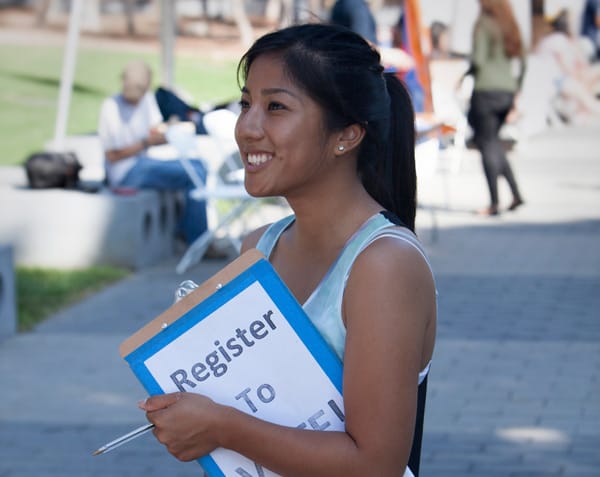SOVAC Registers 1,500+ Students To Vote at UCSD

Credit: Mike Foster

A UCSD student organization, the Student Organized Voter Action Committee (SOVAC) is registering students across their campus before the October 22 deadline. During the school’s move-in weekend, SOVAC registered over 1,500 students.
To register the students, SOVAC negotiated with five of the six colleges at the University of San Diego to become a part of the move-in process. Students registering for housing on campus were directed through a four-step process prior to opening their new door, step one was registering to vote with SOVAC.
As students appeared on campus to move into their new dorm or apartment, they were greeted by SOVAC members in bright yellow shirts. SOVAC members asked each student if they would like to register to vote with their new school address. Students registered to vote on campus are able to utilize one of the multiple polling places that are set up on campus on Election Day.
To remind students to vote on Election Day, the group also negotiated with several food and retail outlets on campus to offer discounts to students wearing a SOVAC pin or wristband on Tuesday until the election. SOVAC will also be making presentations in classes, on campus, and in dorms as they drive to register as many of their peers as possible.
The move-in day effort is a part of a much larger project encompassing multiple organizations including: CALPIRG, CA New Americans, and the University of California Student Association. Collectively the organizations expect to register 5,000 new voters on the UCSD campus alone.
SOVAC is a non-partisan student organization that is well-known on campus for their voter registration efforts. Their membership is made up of students with diverse political ideologies, all committed to democratic participation. The UCSD group is a branch of a California-wide organization on all University of California campuses.
The effort could register enough students to have a decisive effect on California elections, especially Prop 30 that would directly affect college budgets around the state.


